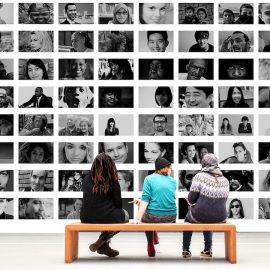

This article is an excerpt from the Shortform summary of "Nudge" by Richard H. Thaler and Cass R. Sunstein. Shortform has the world's best summaries of books you should be reading.
Like this article? Sign up for a free trial here .
What is groupthink theory? How does the groupthink bias work?
The groupthink bias is the way decisions made in a group may not be ideal. People agree to something together that they may not agree to indpendently.
Read on to understand the groupthink bias.
The Groupthink Bias
What is groupthink theory? Studies have shown that human beings are immensely influenced by the opinions of their peers when it comes to making choices.
For example, psychologist Solomon Asch discovered that when subjects were asked to answer simple questions anonymously and individually, they erred very infrequently. But when the subjects were given access to others’ answers, and those answers were incorrect, the subjects also answered incorrectly over 33% of the time. This shows the groupthink bias in action.
One of Asch’s abiding interests was the rise of fascism, and subsequent studies have gone some way toward explaining how groupthink leads to potentially harmful consequences. For example, one study asked participants to agree or disagree with this statement: “Free speech being a privilege rather than a right, it is proper for a society to suspend free speech when it feels threatened.” Subjects answering on their own agreed with the statement only 19% of the time. But when shown that four others agreed with the statement, a whopping 58% of subjects suddenly agreed also.
Politics
Sunstein and Thaler cite John Kerry’s improbable win of the 2004 Democratic nomination as an example of groupthink at work. Kerry’s campaign was all but dead when he managed a surprise victory in Iowa. He then won New Hampshire and a slew of primaries thereafter. The consensus among political analysts is that Democratic primary voters flocked to Kerry because voters perceived the party was rallying around him after his initial Iowa win.
The Spotlight Effect
Another ingredient in the human compulsion to conform is the “spotlight effect”: our (largely mistaken) perception that others are (1) paying close attention to us and (2) judging us.
In one experiment, researchers had student subjects wear a Barry Manilow t-shirt—after determining that Barry Manilow was the most embarrassing celebrity to advertise on a t-shirt—and fill out a questionnaire alongside fellow students. The researchers then made up an excuse to remove the student from the room and, outside, asked the student to estimate how many of his or her fellow students could identify the person on the t-shirt. The average estimate was just under 50%, but the researchers found the actual number was closer to 20%. (The researchers also had subjects watch the classroom on videotape, and these dispassionate observers estimated around 20% as well). In other words, actually wearing the shirt increased the student’s self-consciousness.

———End of Preview———
Like what you just read? Read the rest of the world's best summary of Richard H. Thaler and Cass R. Sunstein's "Nudge" at Shortform .
Here's what you'll find in our full Nudge summary :
- Why subtle changes, like switching the order of two choices, can dramatically change your response
- How to increase the organ donation rate by over 50% through one simple change
- The best way for society to balance individual freedom with social welfare






